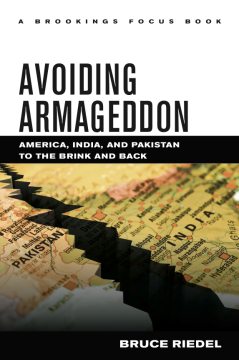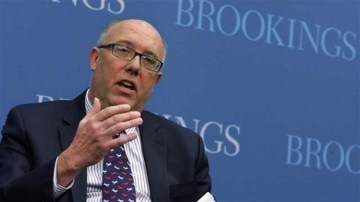India and Pakistan are the children of the British raj. But like many siblings, they don’t get along. India is the world’s largest democracy, and soon will become the planet’s most populous nation. Pakistan, the globe’s sixth-most-populous country, has a long history of military coups, dictators, and harboring terrorists — including Osama bin Laden. In his new book, Avoiding Armageddon, Bruce Riedel, a long-time CIA official now at the Brookings Institution, handicaps the challenges for the U.S. is dealing with these two nations.
The book, based on Riedel’s role in advising four U.S. presidents on the region, reviews the history of American diplomacy in South Asia, the crises that have flared in recent years, and the prospects for future crisis. Battleland did this email chat with him last week from the Strait of Malacca, where he was traveling:
What is the most important takeaway for readers of your new book, Avoiding Armageddon: America, India, and Pakistan to the Brink and Back?
South Asia — especially Pakistan — is the most dangerous place in the world today. Armed with hundreds of nuclear weapons and home to thousands of terrorists, Pakistan and India have repeatedly gone to the brink of war. America has helped walk them back from Armageddon more than once but it may not always succeed.
Are tensions between India and Pakistan getting better or worse? Why?
The India-Pakistan relationship is up and down, but in the absence of stronger economic ties and a resolution of the basic political disputes (especially Kashmir), the two will remain one terrorist attack away from disaster.
How do you apportion responsibility between these two nations for the continuing strife between them?
Pakistan is clearly the more provocative, because too many Pakistanis are unsatisfied with the status quo. But India, too, is capable of dangerous action like testing nuclear weapons.
Has the fact that both are now nuclear states acted as a brake on possible war between them? Why or why not?
The nuclear balance of terror is very fragile.
Unlike the Cold War, where the Artic Ocean separated the two superpowers, India and Pakistan share a ‘hot’ border with frequent incidents.
It is really more like Russian roulette than mutual deterrence.
How secure do you believe each nation’s nuclear arsenal is?
As Pakistan and India expand their arsenals the risk of a bomb getting in the wrong hands grows. Pakistan is also developing tactical nuclear weapons, which are much more easy to grab. And remember the vetting of who commands Pakistan’s bombs is done by its intelligence service, the ISI [Directorate for Inter-Services Intelligence], which is tightly linked to several terrorist groups.
Some of the groups like Lashkar-e-Tayyiba, which attacked Mumbai five years ago, are very sophisticated and capable of using a bomb. The Pakistani military command knows its bombs are their crown jewels, but in a crisis situation the next time India and Pakistan go to the brink expect a lot of anxiety on this issue.
How much of this trouble is due to India’s continued hold on Kashmir?
The conflict over Kashmir lies at the heart of Indo-Pakistani tensions but is not the only issue. It has become symbolic of a larger psychological problem — many Pakistanis, especially the army, resent India’s success, and many Indians believe Pakistan is a crazy state.
India and Pakistan have agreed in principle on how to resolve the problem by giving Kashmir special status — a bit like Ulster — but they lack the political will to go to the next level and make a real deal.
The U.S. should quietly try to encourage them forward, behind the scenes. In the end it is up to them, not us.
The 1947 partition was a disaster in many ways, but we are stuck with the results. How to move out of the shadow of partition’s unfinished business is the issue now for New Delhi and Islamabad.
What is the biggest mistake the U.S. has made in South Asia over the past generation? What is the most important thing for Washington to do about South Asia now?
America’s biggest mistake in south Asia was to undermine civilian rule in Pakistan for decades by backing every military dictator in the country’s history. It was a bipartisan mistake. Presidents from both parties fawned over the generals.
We lost the faith of many Pakistanis this way.
Now we need to get out of only doing conflict-and-crisis management to a bigger game — conflict resolution and regional integration.
It’s a big idea whose time has come. But India and Pakistan must be the leaders, not the U.S.




